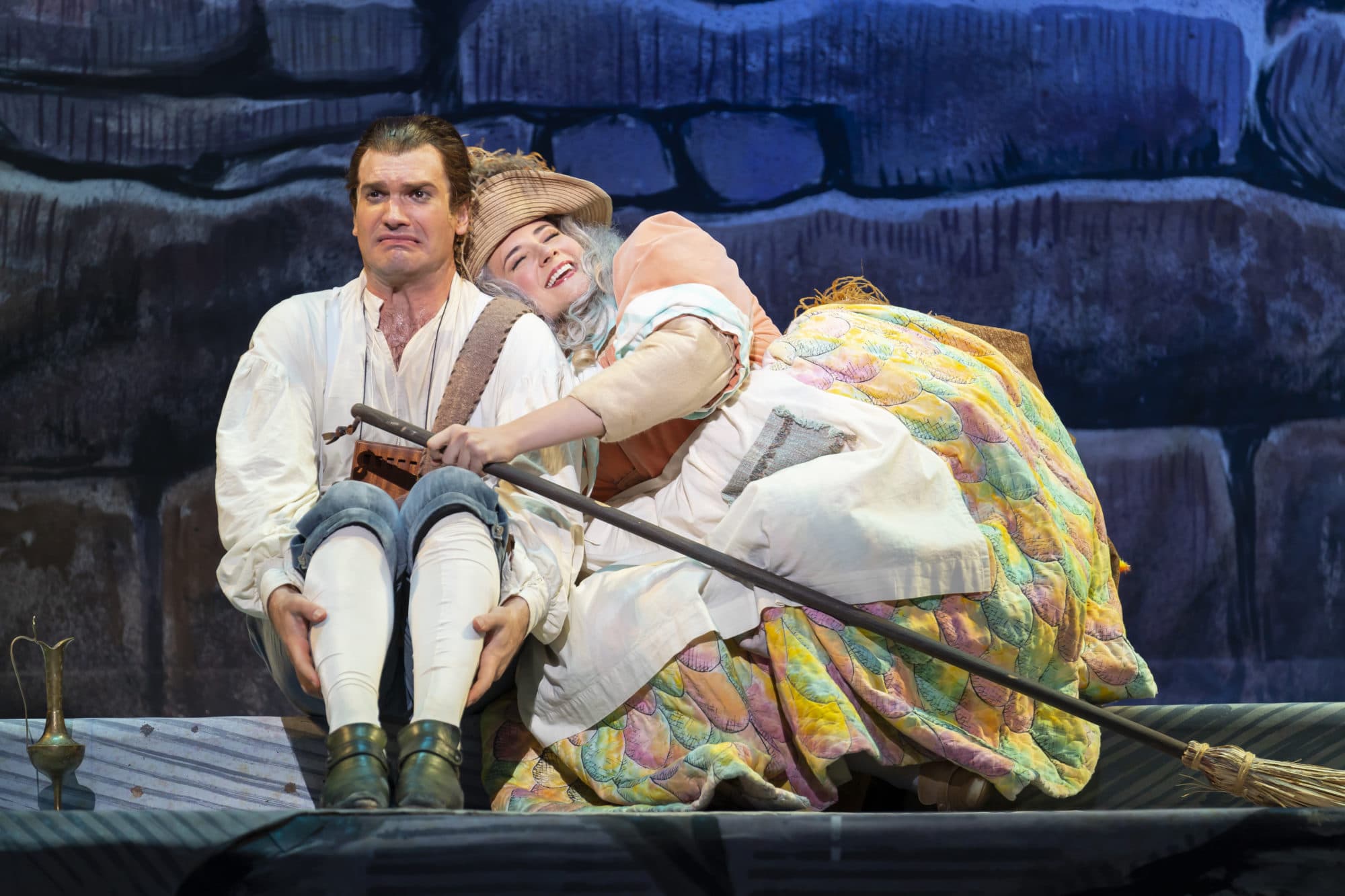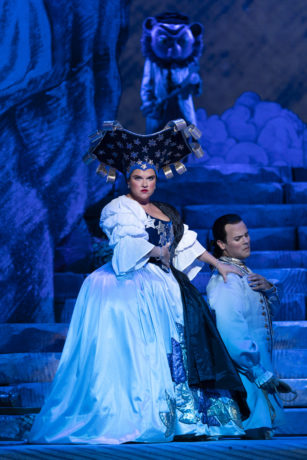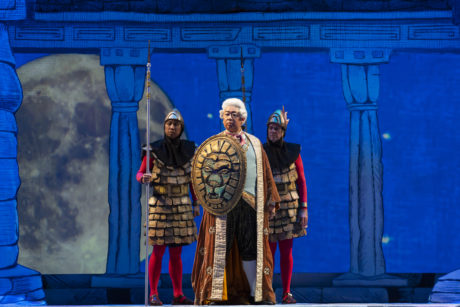The opening night performance of Washington National Opera’s production of Wolfgang A. Mozart’s The Magic Flute was perfectly pleasing, even if the show as written is just too long.

Tradition holds that Mozart’s Flute is a masterpiece, but as I sat through the barrage of threes – three opening chords featuring the three flats in E flat major, three ladies, three boys, three knocks on three temples’ doors, three trials, three times sung for pretty much every thought expressed in every recitative, it was not for the first time – maybe the third! – I wondered if history has over-sold the discursive fairytale on being somehow as great a work as the composer’s dark psychodrama, Don Giovanni, which WNO also will present later this season.
For all the re-interpretations we tolerate in opera, maybe we’d get more out of the masters if sometimes we just cut stuff. Mozart and librettist Emanuel Schikaneder wrote Flute as a Singspiel – German for “a singing play” – with plenty of dialogue as well as singing. Surely, someone can find a satisfactory way to shave a little off the show’s three-hour running time. Even I get a little restless sitting through all those threes, and I learned to love opera in a time when attention spans were measured in minutes, not TikToks.
If Flute is a masterpiece, it’s because Mozart, a member of the esoteric society of Freemasons, managed to make the group’s Age of Enlightenment propaganda entertaining. The show’s draw in modern times is the hit parade it contains, not its allegorical moralizing which is so didactic, WNO’s use of Portland Opera’s fanciful set and costume design, created by the late children’s author and illustrator, Maurice Sendak, is essential for keeping things amusing instead of plodding.
As for those hits, they were well-sung and appreciated by audience members who showered the cast with bravos and applause throughout the evening. The show aptly whetted an operaphile’s appetite for up-and-coming vocal talents, placing them in context with stalwart voices that still can charm and thrill.
A partial rollcall includes American tenor David Portillo as Tamino. Portillo also will lend his sweet sound to the role in the Metropolitan Opera’s production of Flute next month. Pamina was American soprano Sydney Mancasola making her WNO debut and offering a master class in how to follow the column of sound up and down the rigorous aria, Ach ich fühl’s, even if it and the rest of the show was sung in English, not its original German.

American soprano Kathryn Lewek reprised her WNO 2014 role as Queen of the Night, and will join Portillo next month in the Met’s production of the opera. Lewek was a clear audience favorite for her handy taming of the beast that is the aria, Der Hölle Rache kocht in meinem Herzen, the same aria currently featured in a certain luxury car commercial but nowhere near as thrilling as Lewek’s.
American baritone and Domingo-Cafritz Young Artist alumnus Michael Adams was entertaining as Papageno and has a durable sound I expect will keep him employed for years to come. The same can be said for the American soprano and fellow Domingo-Cafritz Young Artist alum, Alexandra Nowakowski, who sang Papagena with a keen comedic flare that makes me wonder if she might consider crossing over to Broadway. The pair drew plenty of laughs as the daffy love birds with their duet, Pa-pa-pa-Papageno.
Should WNO consider mounting another Singspiel, Otto Nicolai’s The Merry Wives of Windsor featuring Domingo-Cafritz graduates soprano Alexandria Shiner and mezzo-soprano Deborah Nansteel, both Americans, would be worth a go. Together with American contralto Meredith Arwady, they managed to sound both bawdy and lovely in this production as Ladies One, Two, and Three, respectively. In this performance, Shiner, who has the capacity to pin a listener’s ears to the back of the head, demonstrated she also can sing with restraint.
I was especially intrigued to hear American bass Kevin Short’s voice juxtaposed in the role of Speaker with that of Chinese bass and Domingo-Cafritz alum Wei Wu in the role of Sarastro. Short is an operatic veteran with such agility and strength in his voice, it’s clear he is enjoying the top of his game. The younger Wu’s low notes are not as resonant as Short’s, making him harder to hear, but he still has a lyrical sound that WNO has justifiably turned to often in recent seasons. Still, since Short is a Marylander and sounds so good, it would be a shame not to hear more of him at WNO.

Similarly, I always enjoy veteran performer American tenor David Cangelosi. In this production, he was Monostatos. Like Short, Cangelosi has been around international opera long enough to telegraph “I got this” to the audience. My guess is that kind of cool has a calming effect backstage, similar to that of a veteran ballplayer sitting on the bench with the jumpy rookies.
I wish Washington audiences would show more love to the WNO chorus under the direction of Steven Gathman. Are they perfect? No, but they are really quite good, and the sopranos do not bleat like goats, a hazard many opera companies know too well. In this performance, more than once chorus members did not receive their due applause, not even after their sudden appearance in the aisles during Act II Scene 8 to boldly sing praises to Osiris, startling awake more than a few snoozing patrons.
The South Korean maestra Eun Sun Kim made her impressive WNO debut, keeping the timing tight and even throughout, allowing the orchestra to bounce and shine, just like it should for this show. American Christopher Mattaliano competently directed the show, although cutting out or speeding up some of the talky bits might help prevent the drowsier audience members from nodding off. Americans Neil Peter Jampolis and John Garofalo collaborated on set, lighting, and projection design.
Running Time: Three hours, with one 25-minute intermission.
Washington National Opera’s The Magic Flute performs through November 23, 2019, at The Kennedy Center Opera House, 2700 F St NW, Washington, DC. For tickets, call 202-467-4600 or go online.





I was not impressed with this production.
Using English instead of the original German is an affront to Mozart and how hard he worked to create an opera “for the German people.”
The constant set changing was unnecessary.
This is the most disappointing production of Mozart’s masterpiece I have seen or heard.
We left early.
Othello and now this mess?
What happened to the Kennedy Center?